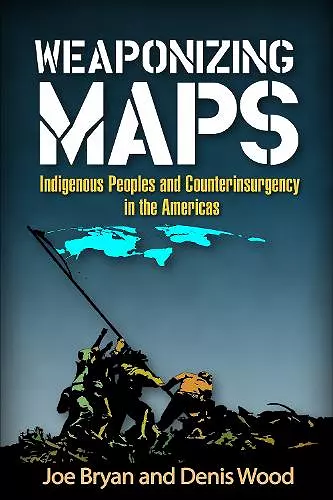Weaponizing Maps
Indigenous Peoples and Counterinsurgency in the Americas
Denis Wood author Joe Bryan author
Format:Paperback
Publisher:Guilford Publications
Published:28th Apr '15
Currently unavailable, and unfortunately no date known when it will be back
This paperback is available in another edition too:
- Hardback£51.99(9781462519927)

Maps play an indispensable role in indigenous peoples’ efforts to secure land rights in the Americas and beyond. Yet indigenous peoples did not invent participatory mapping techniques on their own; they appropriated them from techniques developed for colonial rule and counterinsurgency campaigns, and refined by anthropologists and geographers. Through a series of historical and contemporary examples from Nicaragua, Canada, and Mexico, this book explores the tension between military applications of participatory mapping and its use for political mobilization and advocacy. The authors analyze the emergence of indigenous territories as spaces defined by a collective way of life--and as a particular kind of battleground.
"A gripping account of how academic research, military intelligence, and indigenous mapping projects became embroiled in the service of geopolitics. Bryan and Wood present an adventure story of geopolitical struggle right in the heart of geographical research institutions in the United States and indigenous communities in the Americas. This book is necessary reading for geographers and all social scientists interested in the ways in which knowledge production and state interests merged in the late 20th century."--John Pickles, PhD, Earl N. Phillips Distinguished Professor of International Studies, Department of Geography, University of North Carolina, Chapel Hill
"'Map or be mapped,' the saying goes among those associated with the wave of participatory mapping that began in the 1980s. Weaponizing Maps gives this saying radically new meaning, with equal parts analytic depth and political charge. Readers inclined to use maps for causes of social justice will proceed fully informed of the daunting forces they are up against--from the counterinsurgency designs of the world’s most powerful military to ostensibly progressive scholars who deploy the fine tradition of participatory mapping toward dubious ends."--Charles R. Hale, PhD, Director, LLILAS Benson Latin American Studies and Collections, University of Texas at Austin
"Bold and confrontational. Bryan and Wood pull no punches in their indictment of the creeping militarization of geography and the once-respected American Geographical Society. The book's legacy will be marked by the extent to which geographers rethink their relationships with indigenous groups. It’s quite possible that we’re seeing the next generation of critical thinking about mapping in this book."--Jeremy Crampton, PhD, Department of Geography, University of Kentucky
"Using Oaxaca as a case study of a global trend, the book makes a compelling case that militarized colonial geographies seek to replace Indigenous collective lands with a privatized Western model, under the guise of both national security and Native self-determination. But the book is also a rich example of interdisciplinary inquiry, straddling the normative divides between domestic and foreign colonialism, historical and contemporary surveys, academic and activist analysis, and Indigenous and Left discourse. It is essential for understanding land disputes of the 21st century, anywhere in Native America or the world."--Zoltán Grossman, PhD, Professor of Geography and Native Studies, The Evergreen State College -At times refreshingly polemical and unapologetically critical, Bryan and Wood provide valuable historical sketches that link the ideological and material ramifications of maps on indigenous communities and trace the development of property-based cartographic and geographic logics during wartime. Though the México Indígena project serves as a focal point, the authors deftly weave together the development of the American Geographical Society, the rise of indigenous mapping projects in the 1990s and their subsequent limitations, and the relationship between dominant geographic practices and the academic-military-industrial complex.--Great Plains Research, 10/18/2017ƒƒJoe and Denis trace how maps, over and over and over again, perform vital discursive work, how they transform territory into property, how they create facts, and how those facts seem to, time and time again, serve the particular interest of the state and/or capital at the expense of certain groups of people.--Human Geography, 3/28/2017ƒƒRecommended. Upper-division undergraduates and above.--Choice Reviews, 10/1/2015
ISBN: 9781462519910
Dimensions: unknown
Weight: 406g
272 pages